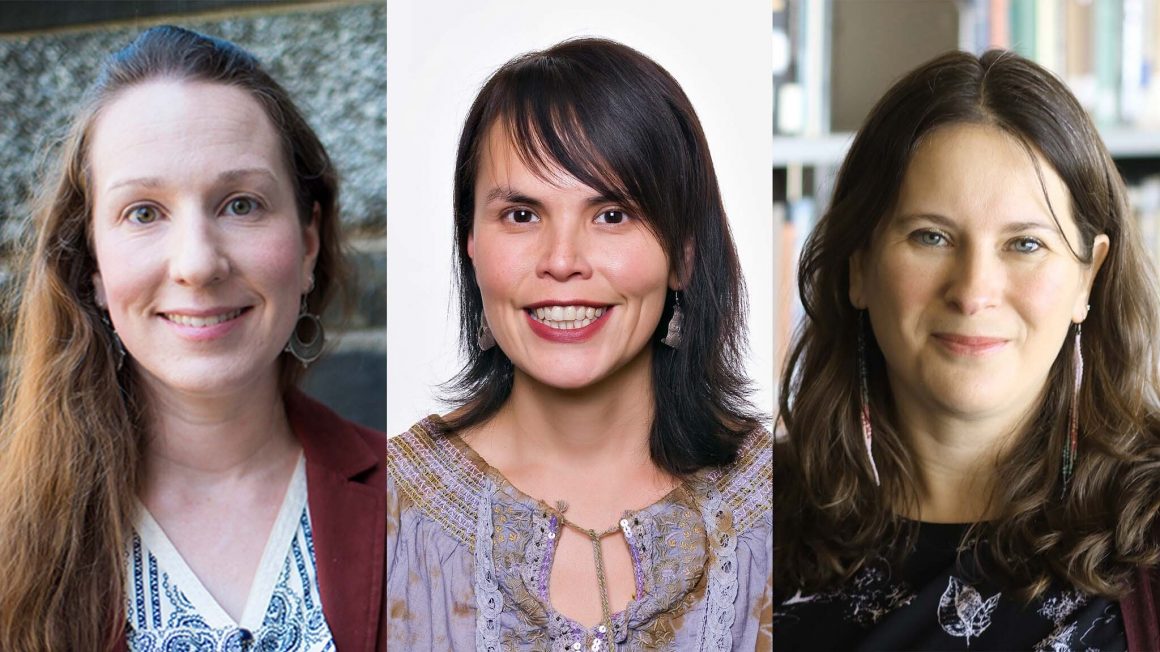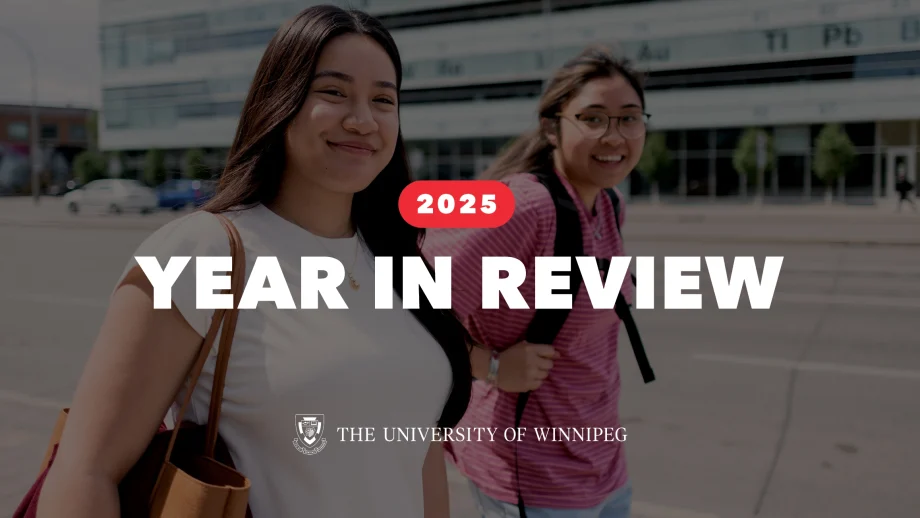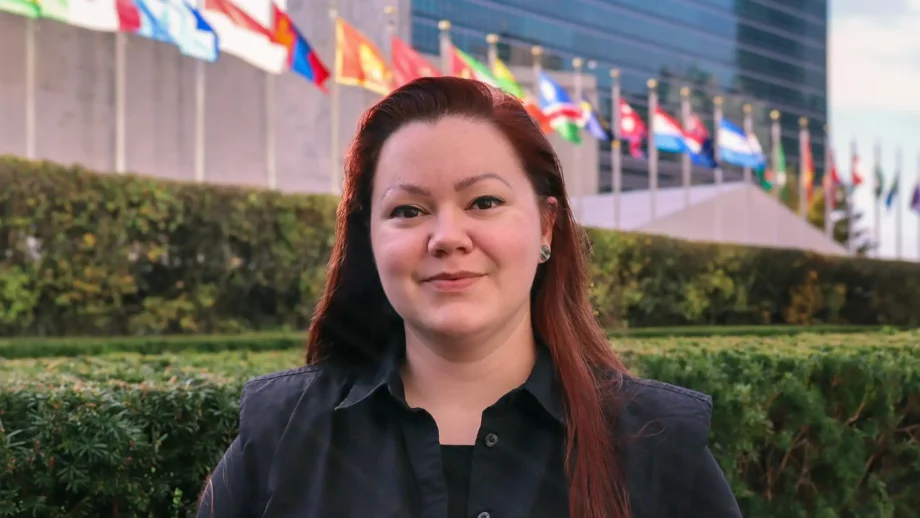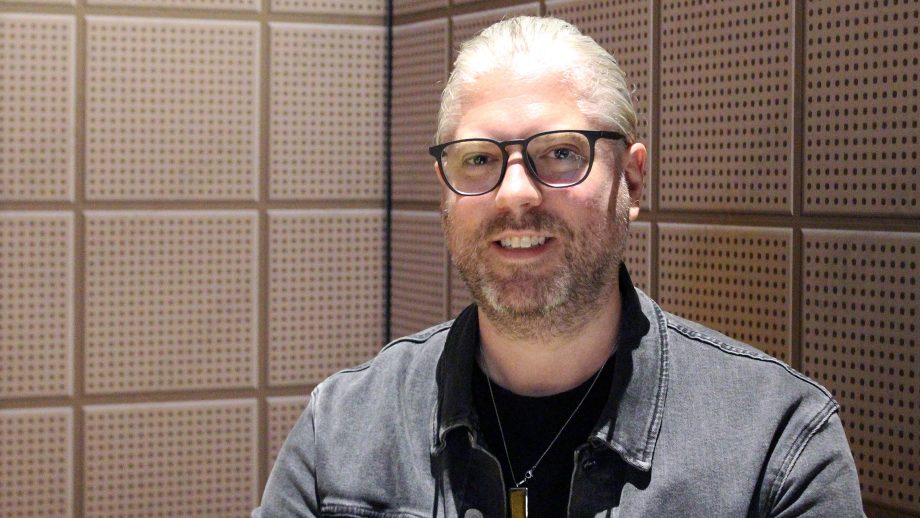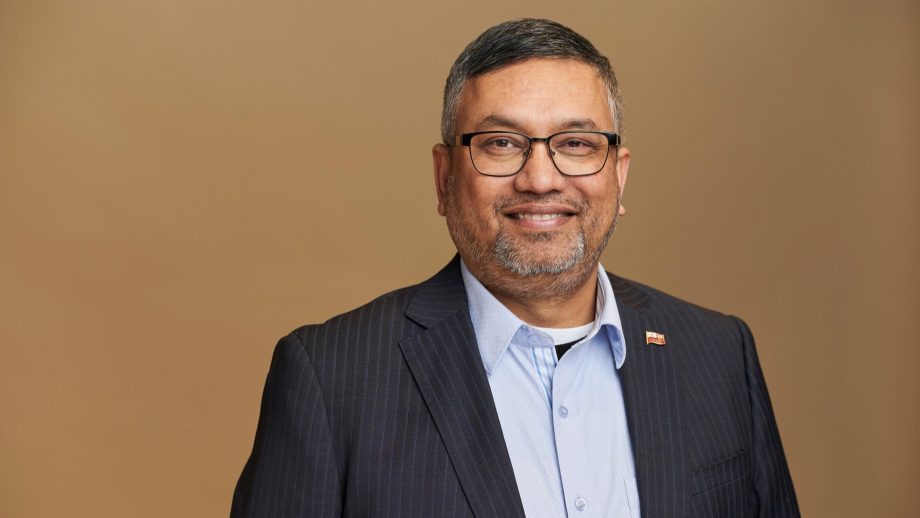In recognition of International Women’s Day, The University of Winnipeg would like to honour all the women in our communities for their scientific, economic, cultural, social, and political contributions.
UWinnipeg would also like to highlight Drs. Lorena Fontaine, Kristi Kenyon, and Shauna Labman of Global College, who are leaders in human rights issues and Indigenous language rights, community builders whose work has inspired minds, and mentors to create a better world here and afar.
Dr. Lorena Sekwan Fontaine – Indigenous Language Rights Warrior
Fontaine is Cree – Anishinaabe and a member of the Sagkeeng First Nation. Currently, she is the Fulbright Canada Research Chair at San Diego State University. Her research includes the legacy of the boarding schools, cultural genocide, and Indigenous language rights.
Fontaine is co-director of the Indigenous Languages Program and an Associate Professor in Human Rights at the University of Winnipeg. She has taught for the First Nations University of Canada and the School of Public Policy Graduate Program at Queens University.
Fontaine has spoken nationally and internationally and has authored articles on residential school issues and Indigenous language rights in Canada. Her research was presented in a CBC documentary entitled “Undoing Linguicide,” which was awarded the 2017 Radio Television Digital News Association Adrienne Clarkson Award for Diversity, Radio and Network.
Recently, she was a co-organizer of an educational forum on the legacy of residential schools and the Holocaust with the United States Holocaust Memorial Museum.
Since 2003, Fontaine has been an advocate for Indigenous Residential School Survivors as well as their descendants. She was a task force member and contributor to the Assembly of First Nations’ report on Canada’s Dispute Resolution Plan to compensate for abuses in Indian Residential Schools. Fontaine also acted as a legal consultant to Toronto-based law firm Thomson Rogers in a National Class Action on Indigenous residential schools.
Fontaine was an Equality Rights Panel member for the Court Challenges Program and a National Steering Committee Member for the National Association of Women and the Law. She has also been involved with the Women’s Legal Education and Action fund as a board and subcommittee member.
Dr. Kristi Heather Kenyon – Human Rights Advocate
Kenyon is a political scientist with particular interests in human rights, civil society, health, development, and qualitative research with a regional focus on sub-Saharan Africa. She is Associate Professor and Program Director in the Human Rights program at Global College, a Research Fellow with the Centre for Foreign Policy Studies at Dalhousie University and serves as the faculty liaison for the Winnipeg branch of the Canadian International Council.
Currently, Kenyon is co-leading a CIHR-funded project with Dr. Alex Kwarteng (Kwame Nkrumah University of Science and Technology, Ghana) and an amazing interdisciplinary team. The project tackles both medical and social dimensions of a neglected disease called Lymphatic Filariasis (LF) in two districts in Ghana. This disease causes disfiguring and swelling, and those suffering often face isolation and stigma in their communities.
“This project is really meaningful to me because it’s an opportunity to listen to people living with LF and better understand the factors that contribute to stigma as well as hesitancy in accessing treatment,” said Kenyon. “People with LF in the communities where we are doing research have talked about how people come from the city to “tell them about LF,” our aim, first and foremost is to listen to their experiences.”
Kenyon’s team is using a wide variety of qualitative, participatory, and arts-based methods to gain insight into this complex situation and develop interventions to improve the quality of life for those with LF.
Kenyon notes: “To me this is applied human rights work – how can we make key human rights principles like dignity and equality real in people’s lives? A real key to this project is attention to cultural context – we can’t really address LF until we understand how people in LF endemic communities view this condition, especially where these understandings are different from biomedical perspectives.”
Kenyon also offers advice to women who want to follow in her footsteps. “Don’t be afraid of breaching disciplinary boundaries!” she said. “We can learn so much when we work together, especially on complex social and health issues. Nobody knows everything. On this project I’m working with social workers, lawyers, scientists, public health professionals, historians and nurses among others. We all hold a different piece of the puzzle.”
Dr. Shauna Labman – Legal Scholar
Labman is a legal scholar who writes and speaks extensively on refugee law, resettlement, and private refugee sponsorship within a broader context of human rights and public international law. She focuses on the layered influences of law on public policy and government positioning.
She is currently working as one of the Prairie Academic Leads, along with UWinnipeg’s Dr. Sarah Zell, on the Pan-Canadian Task Force on Women in Migration, a new project funded by Women and Gender Equality Canada’s Feminist Response and Recovery Fund and being led by the Migrant Workers Centre in Vancouver. Labman unfortunately feels her work is most necessary in times of tragedy, in particular when asylum seekers drown at sea, die near borders or new situations of forced displacement arise.
“I use my voice to challenge policies and laws that limit access to protection to those who are entitled to it in international and domestic law while advocating for complementary pathways through government resettlement and private sponsorship,” shared Labman. “There is also a public facing aspect of my work that involves myth-busting misunderstandings of our border, explaining why and how people claim asylum and exploring how we can better welcome refugees to Canada.”
Her book, Crossing Law’s Border: Canada’s Refugee Resettlement Program (UBC Press 2019), examines the intersection of international rights, responsibility, and obligation in the absence of a legal scheme for refugee resettlement. Crossing Law’s Border was awarded the 2019 K.D. Srivastava Prize for Excellence in Scholarly Publishing. Labman is co-editor of the book Strangers to Neighbours: Refugee Sponsorship in Context (MQUP 2020). The two books were named in The Hill Times’ list of 100 Best Books in 2019 and 2020, respectively.
Labman offers some words of advice. “There are no rules or timelines you need to follow,” she said. “We all take our own meandering paths but pursue things that you are passionate about, that excite you, that propel you forward. Seek out mentors you trust for guidance but also trust your gut. No one knows you more than you do.”

